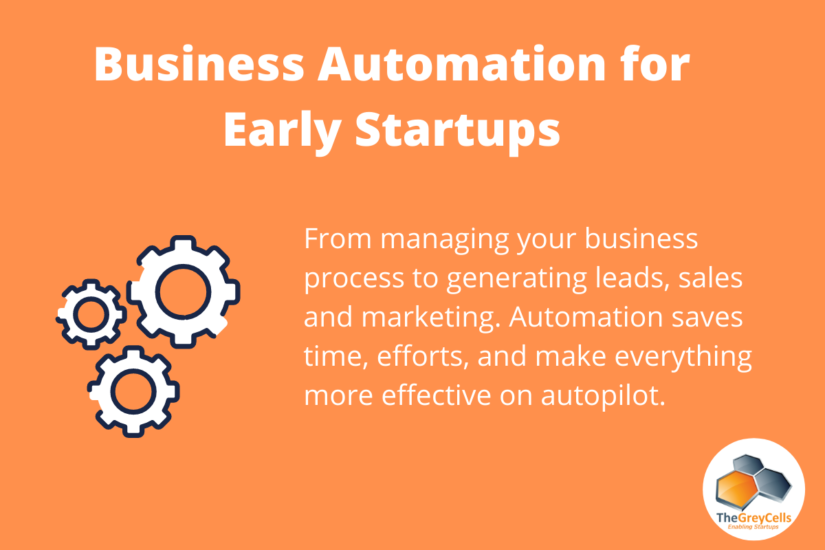Business Automation for Early Startups


Business automation is a technology-driven application that completes repetitive tasks, saving time for employees for other higher-value work. The probability of human error is highly reduced, as automation is based on algorithms that are fast and precise.
In the past, setting up automation required software and hardware, and experts to maintain them, but in the digital world, cloud-based software makes various automation possible and accessible at one click.
In the present digital ecosystem, startups and businesses of all sizes and industries are making use of business automation from management to marketing.
In this article, we will be sharing a few useful business automation for early startups that reduce the dependence on more helping hands, save money, time, and effort for the startup founders.
Where Business Automation Can Help?
1. Business Process Management
Business process automation allows startups and businesses to streamline critical processes in management to reduce the complexity of multiple tasks. Building a startup is building a business process, which takes your resources, investment, efforts, time, and knowledge at the input and returns revenue, value, and customers at the output.
The more effective your business process is, the better your startup will be.
Several automation tools such as Customer relationship Management (CRM), Enterprise Resource Planning (ERP), time management software, human resource management, finance management, etc., are available to enhance the business process.
2. Marketing, Leads & Sales Automation
Revenue generation is essential for a startup. Early founders often struggle to gain traffic on their website, leads, and sales. Hiring marketing experts will be adding an additional burden to their pocket.
Making use of marketing automation software, it’s easily possible to automate monotonous marketing tasks. Repetitive tasks such as sending email, chat replies, social media posting, can be effectively done through automated tools.
3. Customer Service Automation
Customer service is an essential factor for the success of a startup. Almost every product or service-based company provides 24/7 support to their customer for technical and non-technical support.
In order to accomplish such a promising support system, automation has played a key role.
4. Data Analysis
Analyzing marketing, sales, and other business data is one of the critical factors that impact future decisions and actions in a startup. To analyze data manually would be tiring and time-consuming.
However, making use of automation platforms to depict and pictorially represent data makes the game much easier. Large business data is understood with minimal human effort.
Be it LinkedIn, Facebook, WordPress, Google Analytics; every platform has an in-build data representation system to assist users to understand the result of their outcome easily. CRM that keeps track of customers could be said as another data management automation.
Some of the Example of Business Automation
1. Customer Relationship Management (CRM)
CRM is a popular and most useful automation example in the present business ecosystem. Ranging from a small startup to an enterprise; CRM is available for all—free as well as paid.
CRM allows businesses to organize and automate the relationship with their customers—the most important aspect of a startup. It holds the name, address, contact details, other information, reminds us of the scheduled meetings, and structures the overall business process.
ZOHO, Salesforce, HubSpot, Nimble, Keap are some of the popular CRM popular in the market.
2. Email Marketing Automation
Imagine yourself tying a “thanks for purchase” email to every customer in your eCommerce store.
How much time will be wasted, typing and sending it manually!
That’s where email automation comes in. Email automation sends pre-defined emails on triggered action to the recipient and keeps the communication well informed and engaged.
To use email automation, platforms like Mailchimp, ActiveCampaign, Drip, MooSend, etc are popular in the industry. To get started, start building an email list, write an email for different purposes and automate it on various occasions.
3. Chatbot
Chatbots are chat robots. They are one of the trending customer support automation tools, popular on chatting applications like Facebook Messenger, WhatsApp, SMS. Even websites are built with an interactive chatbot sitting in the corner; ready to assist visitors with information, sales, and support.
Some chatbots are smart enough, built-in with technologies like Natural Language Processing (NLP) and machine learning (ML) to understand the customer’s intent and reply to their queries automatically and immediately.
Companies like Amplify.ai, Beep Boop, Bottr, Chatfuel, Manychat, etc offer efficient chatbots for industrious of all types for marketing, support, and sales. Setting up a chatbot is easy, however, users need to train the chatbot with queries and replies.
Small startups can use chatbots on websites and social platforms, boost sales, and upsurge marketing.
4. Social Media Post Scheduling
Manual social posting consistently is not easy, especially when your new startup needs you more than anything else. But social posting automation makes it easy.
Tools like Hootsuite, Buffer, SocialPilot, Sendible, CoSchedule, are some of the popular options for businesses looking for social posting. These platforms allow you to schedule social posts, curate posts for re-posting, analyze viewers, and produce analytical reports.
Conclusion
With the right automation playing its role in your startup, several processes would turn automatic, making it much easier, saving your time, effort, and finances for other purposes.
Start with a few automation tools, learn to implement well, and jump to next. Keep growing, keep automating.

















Comments are closed.